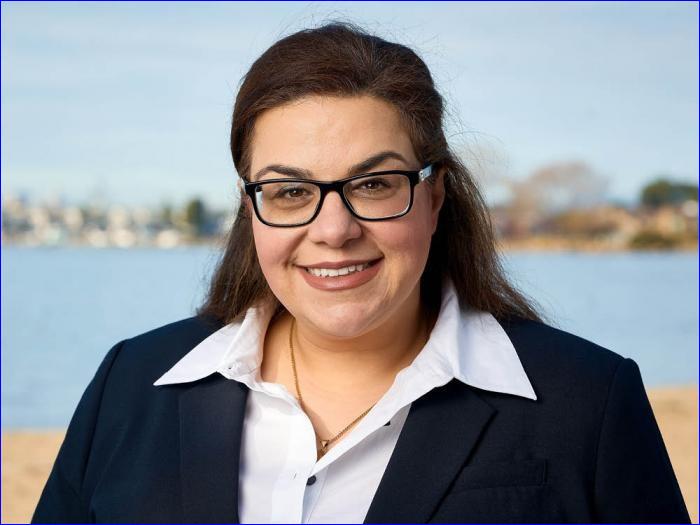


"In Persian, there is a saying that even an old fish is a new fish when taken out of the water. It is the same as saying better late than never," Satarzadeh, 46, told the Bay Area Reporter during a phone interview January 30 to discuss her judicial appointment.
A year after becoming a court commissioner in Alameda County in 2018, where she has presided over small claims, traffic, and child support cases, Satarzadeh had applied with Newsom's judicial appointments office to be considered for a judicial vacancy on the bench. She learned January 23 that she would be filling the seat left empty by the retirement of Judge Jacob Blea, whose six-year term ends on January 8, 2029.
"It was so thrilling to finally get this appointment," she said. "I never felt entitled to it. So I very much had prepared myself to not ever having the position, and I was in an assignment doing child support, which I loved, and could have spent the rest of my career helping families in Alameda County."
A lesbian married mom of a 19-month-old toddler, the only person she could tell the news to until it was officially announced late Monday night was her wife, Maggie Marano, a children's book author and executive at mental health firm Headspace. The couple, together 11 years and married since 2016, reside in Alameda.
"Luckily, my daughter can't speak very much," joked Satarzadeh about needing to keep her appointment a secret until now.
She will take her judicial oath of office Friday, February 2. Based on the court's demographic data released last March, Satarzadeh will bring the number of LGBTQ judges on the Alameda County bench to 11.
"I feel like I am floating on cloud nine. It is a surreal feeling," said Satarzadeh, a former co-chair in the early 2010s of the Alice B. Toklas LGBTQ Democratic Club based in San Francisco.
With their daughter, Emma, now preschool age, Satarzadeh said her judicial appointment comes at a time that works for her family. She told the B.A.R. she is excited to bring the perspective of a parent, and the patience and humility the role requires, to the bench as a judge.
"As a judge I know that it is going to be a lot more responsibility and a lot more work. Luckily my daughter is old enough to be in preschool," she said. "We are able to leave her at preschool, and my wife is my greatest support. The timing of this judgeship couldn't come at a better time because my family life is now organized in a way I can devote myself to this new role."
At 8 years old Satarzadeh emigrated with her family from Iran first to London then the U.S. They had settled in California's Central Valley until her father, who worked as an engineer, relocated the family because of his career to Los Angeles and later Silicon Valley, where her parents still reside in San Jose.
Satarzadeh, who earned her law degree from Golden Gate University, worked as an associate at the Cartwright Law Firm from 2002 until being hired as a legal research attorney by the Alameda County court in 2004. She remained in the position until becoming a commissioner for the East Bay bench.
Fluent in English, Farsi, and Assyrian, and having used all three languages in the courtroom, Satarzadeh said she is now learning Spanish due to the rapport she is able to build with litigants by speaking even "a few words" to them in their native language. She told the B.A.R. she knows of only one other Assyrian member of the state's judiciary, Los Angeles County Judge George F. Bird Jr., who texted her congratulations.
She had met Bird, who did not immediately respond to a request for comment, in 2019 when she took a judicial college seminar that he led. Assyrians are the Indigenous people from what are now the countries of Iran, Iraq, Turkey and Syria, explained Satarzadeh.
"We are a rare breed," she told the B.A.R., stressing that she wanted "to get across how poignant this appointment is for me. One of the reasons I decided to apply to be a judge and a commissioner is I really wanted someone on the bench that looked like me, a lesbian woman of color with an immigrant background."
Her wife and mother, Violet Satarzadeh, enrobed her when she became a court commissioner. She has yet to decide whom she will ask to do so at her judicial swearing in ceremony on Friday.
"I stand on the shoulders of so many people who have supported my candidacy," she said. "I am so grateful to all of them. I am going to really have to think through who will do it, but definitely Maggie will be a part of the ceremony in a very special way because she has been my number one supporter."

or register to post a comment.